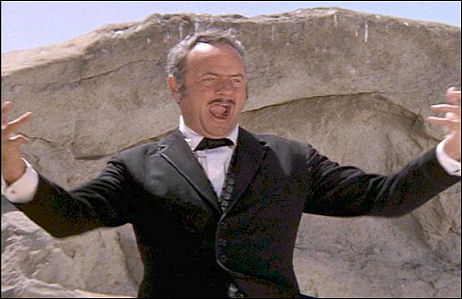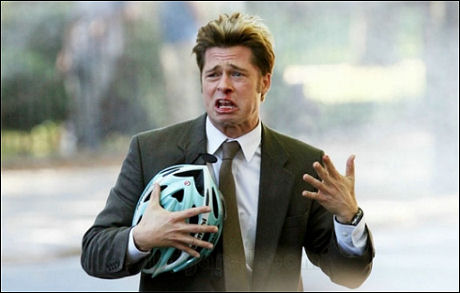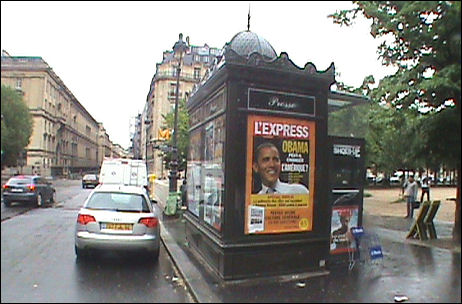Getting on on Air France 777 now (1:03 pm), having missed the 10:15 am flight. (Don’t ask.) Before every flight, I cross myself and ask God Almighty not to seat me next to a morbidly obese person. There are at least two whales in line right now, and I’m feeling a very slight apprehension about this. There are thousands of people in Paris who look well-fed or stocky or fat, but I’ve seen no Jabbas. You might expect otherwise in a foodie city like Paris, but nope.
Update: No fatties but Doug Liman is on my plane. He’s returning from a trip to three African countries, at least one or two of which (Rwanda or Uganda or both) proved to be fairly dangerous. He told me was arrested once, and possibly twice. I admire the cojones of anyone willing to risk the worst to order to encounter things unique, surprising, challenging. We talked about the red-clay color of Uganda’s dirt. Liman’s boot laces were untiedcand flopping around as we walked and talked. He was wearing a round-brimmed straw hat.
Give It Up
I need to be fair and and admit that the career-spanning video on Tom Cruise‘s website is nicely cut. (The Air France terminal I’m typing this on won’t let me load links, but it’s www.tomcruise.com.) Now and then some of it makes you grin in admiration for the guy…truly. The one scene in the entire reel that brought a genuine smile to my face? When Cruise’s Joel Goodson spots Rebecca DeMornay‘s prostitute character in the lobby of a plush Chicago hotel and does that little two-shakes-of-an-index-finger wag as I way of saying “I see you, you see me, we’re both here…tah-tah!”
Little Froggy
Harvey Korman has died; Hedley Lamarr lives.

Lugubriously South
“There is something depressingly stunted about this movie; something desperate too. It isn’t that Carrie has grown older or overly familiar. It’s that awash in materialism and narcissism, a cloth flower pinned to her dress where cool chicks wear their Obama buttons, this It Girl has become totally Ick.” — from Manohla Dargis‘ SATC review in today’s N.Y. Times.
Done Right
By a standard set many years ago by Audrey Hepburn in Funny Face, “the women in Sex and the City are little better than also-rans,” writes the New Yorker‘s Anthony Lane, “and their gallops of conspicuous consumption seem oddly joyless, as displacement activities tend to be.


David Hughes’ illustration for Lane’s review; one of Fancis Bacon’s Popes.
√ɬ¢√¢‚Äö¬¨√Ö‚Äú’When Samantha couldn’t get off, she got things,’ Carrie says. Look at the beam in your own eye, sister. Mr. Big not only buys her a penthouse apartment (‘I got it’), he offers to customize the space for her shoes and other fetishes. ‘I can build you a better closet,’ he says, as if that were a binding condition of their sexual harmony: if he builds it, she will come.
“The creepiest aspect of this sequence was the sound that rose from the audience as he displayed the finished closet: gasps, fluttering moans, and, beside me, two women applauding.
“The tactic here is basically pornographic — arouse the viewer with image upon image of what lies just beyond her reach — and the film makes feeble attempts to rein it in.
“When the wedding hits a bump (look out for Kristin Davis screaming ‘No! No!’ at Chris Noth like a ninth grader auditioning for The Crucible), and the bridegroom veers away, our heroine’s reaction to the split is typical: ‘How am I going to get my clothes?’ What, honey, even the puffball skirt that you wear to the catwalk show — the one that makes you look like a giant inverted mushroom?
Red Burn
The red-band trailer for the Coen Bros.’ Burn After Reading (Focus Features, 9.12) tells you it’ll almost certainly be — surprise! — a dry, deadpan thing mixed with broad slapstick, and probably hilarious. My favorite aspect, though, is the photography by Emmanuel “Chivo” Lubezski, whose legendary work on Children on Men was passed over last year for the Best Cinematography Oscar. A larger version.

Joint Was Jumpin’
Cafe Charbon, a beautifully preserved (late 19th Century) bar in the Menilmontant district, was an absolute madhouse an hour or so ago. Insane. My return flight leaves tomorrow morning around 10:15 am, putting me back on JFK terra firma around noon.
Last Snaps

Thursday, 5.29, 4:25 pm.

5.29, 7:35 pm.

5.29, 2:35 pm.
Bellwether
Huffington Post‘s Hillary Rosen has reported that at last night’s “All Things Digital” conference in Carlsbad, California, media bigwig and staunch conservative Rupert Murdoch said that Barack Obama “is a rock star…I love what he is saying about education [and] I think he will win and I am anxious to meet him.”
John McCain, he added, “is a friend of mine. But I think he’s got a lot of problems. He has been in Congress a long time, and you have to make a lot of compromises. So what’s he really stand for?… I think he has a lot of problems.”
Traffic
Early yesterday evening on the way to meet friends for dinner in the 17th.
Nutty Cop
My idea is this: Eddie Murphy shouldn’t return as “Axel Foley” proper in the new, Brett Ratner-directed Beverly Hills Cop flick (the fourth), which will shoot sometime next year and come out in 2010. He should play Axel gone to seed, as a 375-pound prosthetic fat-ass. I know that Ratner and the team have to do something for the film not to seem like a creaky retread, and this would be that.
Yellow Peril
Houston, we have a problem. They can’t just put it all into a bag, take a space walk, give it a toss and let it float away?


